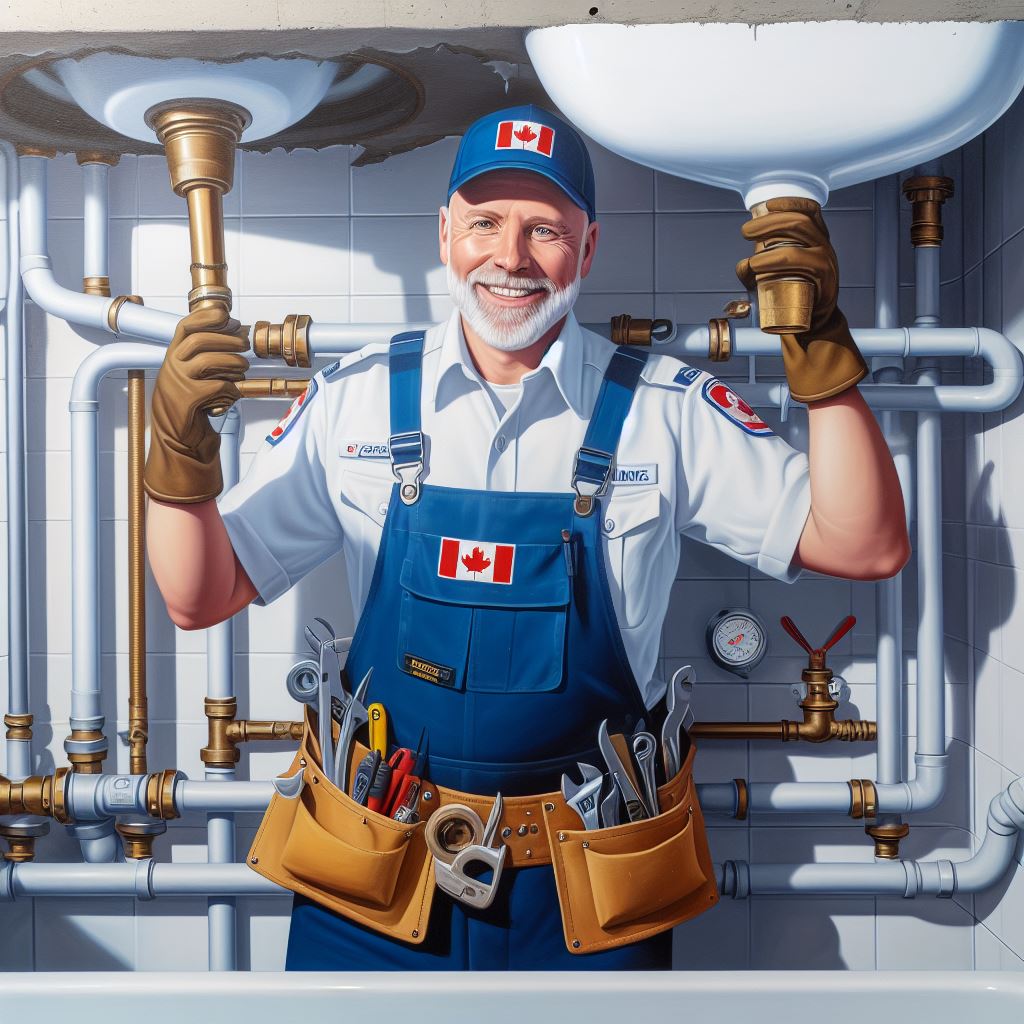Introduction
Plumbing services play a crucial role in both the commercial and residential sectors of Canada.
From ensuring clean water supply to proper waste disposal, plumbing services are vital for maintaining functioning buildings.
In the commercial sector, proper plumbing is essential for businesses to operate efficiently.
It supports various functionalities such as restroom facilities, kitchen operations, and industrial processes. A well-maintained plumbing system promotes productivity and a comfortable working environment.
Similarly, in the residential sector, plumbing services ensure the smooth functioning of households.
From showers to toilets, kitchen sinks to laundry machines, homeowners rely on the plumbing system for their day-to-day activities.
A well-functioning plumbing system provides convenience and enhances the quality of life.
Moreover, plumbing services in both sectors address critical health and safety concerns. Proper plumbing prevents water contamination and the spread of diseases.
It also ensures an appropriate disposal system that eliminates potential hazards.
Adequate plumbing maintenance reduces the risk of plumbing emergencies, such as leaks or burst pipes, which can cause property damage and disrupt daily operations or homeowners’ lives.
Overall, commercial and residential plumbing services are essential for maintaining a healthy and functional environment.
Whether it is a large business complex or a cozy home, reliable plumbing is essential for the well-being of individuals and the smooth operation of businesses in Canada.
Differences between Commercial and Residential Plumbing
Define commercial plumbing
Commercial plumbing refers to the specialized field of plumbing that focuses on the installation, repair, and maintenance of plumbing systems in commercial buildings, such as offices, restaurants, hotels, and retail stores.
Define residential plumbing
Residential plumbing, on the other hand, deals with the plumbing needs of individual homes and dwellings.
It includes the installation, repair, and maintenance of plumbing systems in residential properties.
The key differences between the two
Below are the key differences between commercial and residential plumbing:
1. Size and Complexity
- Commercial plumbing systems are usually larger and more complex due to the size of commercial buildings.
- Residential plumbing systems are relatively smaller and simpler compared to commercial ones.
2. Design and Installation
- Commercial plumbing systems often require more intricate designs and professional expertise during installation.
- Residential plumbing systems have simpler designs and can be installed by homeowners or general plumbers.
3. Water Demand
- Commercial buildings typically have higher water demands, requiring larger supply lines and more robust plumbing fixtures.
- Residential properties have lower water demands, allowing for smaller supply lines and standard plumbing fixtures.
4. Regulations and Codes
- Commercial plumbing must comply with specific building codes and regulations set by local authorities due to public safety concerns.
- Residential plumbing also follows building codes and regulations, but the requirements may be less stringent compared to commercial standards.
5. Usage Frequency
- Commercial plumbing systems experience higher usage frequency and are designed to withstand heavy usage.
- Residential plumbing systems are used less frequently and are not subjected to the same level of demand as commercial systems.
6. Sizing and Piping Materials
- Commercial plumbing often requires larger pipe sizes made from durable materials like copper, stainless steel, or PVC.
- Residential plumbing primarily utilizes smaller pipe sizes and materials like PVC, PEX, or copper.
7. Maintenance and Repair
- Due to their complexity, commercial plumbing systems may require specialized maintenance and repair services from commercial plumbers.
- Residential plumbing can be maintained and repaired by general plumbers or homeowners themselves, given the simpler nature of the systems.
8. Cost
- Generally, commercial plumbing projects are more expensive than residential plumbing due to the size and complexity involved.
- Residential plumbing projects are comparatively less costly, although expenses may vary depending on the scope of work.
Understanding these differences between commercial and residential plumbing is crucial for choosing the right plumbing professionals and ensuring efficient and effective plumbing services in each respective setting.
Read: Electrical Safety Standards in Canada Explained
Commercial Plumbing in Canada
Specific Needs and Requirements of Commercial Buildings
Commercial plumbing in Canada involves specialized knowledge and skills to cater to the unique needs and requirements of large-scale buildings.
These plumbers must possess expertise in handling extensive plumbing systems, adhering to regulations, and resolving complex challenges.
Specifically, commercial buildings have greater plumbing demands compared to residential properties.
Plumbing systems in these establishments must accommodate various functions, including bathrooms, kitchens, and industrial processes.
As a result, commercial plumbers need to install robust systems capable of handling higher water pressures and flow rates.
Additionally, commercial buildings have strict regulations and building codes that plumbers must follow.
These guidelines ensure the safety, efficiency, and sustainability of plumbing installations.
Unlock Your Career Potential
Visualize a clear path to success with our tailored Career Consulting service. Personalized insights in just 1-3 days.
Get StartedCommercial plumbers must use specialized equipment and materials that comply with the standards set by regulatory bodies.
Types of Projects Handled by Commercial Plumbers
The types of projects handled by commercial plumbers are diverse and widespread.
They are responsible for installing plumbing systems in new commercial buildings, such as office complexes, shopping malls, hotels, hospitals, and industrial facilities.
Furthermore, they perform maintenance and repairs on existing plumbing systems, including sewer lines, drain cleaning, and backflow prevention.
Challenges Faced by Commercial Plumbers
Commercial plumbers also face unique challenges in their line of work.
Managing increased water demand and maintaining consistent water pressure throughout the building are significant concerns.
The interconnectivity of plumbing systems, serving multiple floors and areas, requires careful planning and expertise to ensure proper functionality.
Promptly addressing leaks and blockages is vital to avoiding disruptions and preventing water damage.
Commercial plumbers must stay up to date with the latest building codes and regulations to ensure compliance during installations.
They also face time constraints and must coordinate with other professionals in construction projects to meet deadlines efficiently.
Moreover, commercial plumbers often encounter emergencies that demand immediate attention.
Quick response times are crucial to minimize downtime and maintain the building’s operations smoothly.
In short, commercial plumbing in Canada goes beyond the scope of residential plumbing.
Specialized knowledge, adherence to regulations, and the ability to handle complex challenges are essential for commercial plumbers.
Their work encompasses diverse projects and requires expertise in areas such as installation, maintenance, and emergency response.
Read: Green Energy and the Canadian Electrician
Residential Plumbing in Canada
The common plumbing issues faced by homeowners
- Leaking faucets, toilets, and pipes are common plumbing issues faced by homeowners.
- Clogged drains and toilets are frequent problems that require residential plumbing services.
- Water pressure problems, such as low water pressure or inconsistent water flow, are often encountered.
- Water heater malfunctions, including no hot water or insufficient hot water, can be frustrating for homeowners.
- Sewer line issues, such as blockages or leaks, can cause significant damage if not addressed promptly.
- Frozen or burst pipes during winter months are a common concern in colder regions of Canada.
The types of projects handled by residential plumbers
- Installing and repairing faucets, toilets, sinks, showers, and other bathroom fixtures is a primary task.
- Residential plumbers handle the installation and maintenance of water heaters and boilers.
- They also deal with pipe repair and replacement, including fixing leaks and addressing burst pipes.
- Drain cleaning and addressing clogged drains are routine tasks performed by residential plumbers.
- Residential plumbers can assist in the installation and maintenance of plumbing systems in newly constructed homes.
- They also provide services for kitchen plumbing, including garbage disposal installation and dishwasher repairs.
The challenges faced by residential plumbers
- Working in confined spaces can be challenging for residential plumbers, especially in older homes.
- Residential plumbers often face unanticipated problems or complications that require quick thinking and problem-solving skills.
- Handling complex plumbing systems and ensuring compatibility with other home systems can be demanding.
- Dealing with emergencies, such as burst pipes or sewage backups, requires prompt and efficient action.
- Providing satisfactory services while maintaining a high level of professionalism and customer satisfaction is a constant challenge.
- Keeping up with the latest advancements in plumbing technology and codes is essential for residential plumbers.
In fact, residential plumbing in Canada involves addressing common issues like leaks, clogs, low water pressure, and water heater malfunctions.
Residential plumbers handle various projects, including fixture installation, pipe repair, and drain cleaning.
They face challenges like confined spaces, unexpected complications, and the need for prompt solutions.
To meet these challenges, residential plumbers must stay updated with plumbing technology and regulations while providing exemplary services to homeowners.
Read: Impact of Technology on Electricians in Canada

Skills and Qualifications
Necessary Skills and Qualifications for Commercial Plumbers
- Extensive knowledge of commercial plumbing systems, including large-scale pipe installations and complex water supply systems.
- Strong problem-solving skills to troubleshoot and repair issues in commercial buildings.
- Ability to read and interpret blueprints and technical drawings accurately.
- Proficiency in using specialized tools and equipment required for commercial plumbing projects.
- Excellent communication skills to collaborate with other contractors and clients effectively.
- Physical fitness and stamina to handle the demands of working in large construction sites.
- Deep understanding of building codes and regulations to ensure compliance with safety standards.
- Experience in installing and maintaining commercial fixtures, such as sinks, toilets, and water heaters.
- Attention to detail to ensure precise measurements and proper fittings during pipe installations.
- Ability to work independently or as part of a team to complete projects within deadlines.
Necessary Skills and Qualifications for Residential Plumbers
- Proficiency in residential plumbing systems, including basic pipe installations and repair work.
- Knowledge of common residential plumbing issues, such as leaky faucets, clogged drains, and sewer backups.
- Familiarity with residential blueprints and diagrams to identify the location of plumbing fixtures.
- Skill in using hand and power tools commonly used in residential plumbing work.
- Strong customer service skills to interact with homeowners and address their concerns.
- Physical dexterity to maneuver in tight spaces while performing plumbing tasks.
- Understanding of local plumbing codes and regulations applicable to residential construction.
- Experience in installing and repairing common fixtures found in homes, such as toilets, sinks, and showers.
- Attention to detail to ensure accurate measurements and proper fittings during installations.
- Time management skills to handle multiple residential projects concurrently and meet deadlines.
Additional Certifications or Licenses Required in Canada
- Inter-Provincial Red Seal Certification: This nationally recognized certificate is common in both commercial and residential plumbing.
- Apprenticeship Completion: Plumbers in Canada often complete a multi-year apprenticeship program to gain practical experience.
- Trade Qualification Exam: Plumbers must pass a written exam to become certified in their respective provinces.
- Gas Technician License: For plumbers involved in natural gas installations, an additional license may be required.
- Backflow Prevention Certification: Plumbers must acquire this certification to ensure water supply remains contaminant-free.
- Cross Connection Control Specialist Certification: Plumbing professionals responsible for preventing cross-connections in water lines need this certification.
- Health and Safety Certification: Plumbers must be trained and certified in safety protocols to promote a secure work environment.
Both commercial and residential plumbing require specific skills, qualifications, and certifications in Canada.
Commercial plumbers deal with large-scale projects, complex systems, and extensive knowledge of building codes.
On the other hand, residential plumbers focus on basic installations, repairs, and customer service.
In addition, certifications like the Red Seal, apprenticeships, and specific licenses ensure high-quality work and compliance with regulations.
Achieving and maintaining these skills and certifications form a solid foundation for success in the plumbing industry.
Read: Apprenticeships in Electrical Work: A CA Guide
Tools and Equipment
Tools and Equipment commonly used by commercial plumbers
- Pipe cutters: essential for precision cutting of various pipe materials.
- Pipe wrenches: used to grip and turn pipes and fittings with adjustable jaws.
- Torch and soldering equipment: for joining copper pipes through soldering.
- Threaders and dies: used to create threaded connections in pipes.
- Plumb bobs and levels: for accurate measurement and alignment of vertical and horizontal pipes.
- Pipe reamers: ensure smooth edges on pipes for proper fittings installation.
- Digital pipe locators: used to trace underground pipes and utilities.
- Pipe inspection cameras: allow plumbers to visually inspect the inside of pipes.
- Pipe freezing kits: temporarily freeze water inside pipes to make repairs without shutting off the water supply.
- Power drain cleaners: high-pressure equipment used for drain cleaning in commercial settings.
Tools and Equipment commonly used by residential plumbers
- Plunger: the most basic tool for unclogging toilets, sinks, and drains.
- Adjustable wrench: versatile tool for tightening or loosening nuts and bolts.
- Basin wrench: designed for reaching tight spaces when installing or removing faucets.
- Pipe wrench: used to grip and turn pipes and fittings in residential plumbing systems.
- Auger or snake: long, flexible tool for clearing clogs in drains and pipes.
- Hacksaw: ideal for cutting plastic or metal pipes.
- Teflon tape: prevents leaks by providing a tight seal on threaded pipe connections.
- Plumber’s putty: used to seal gaps between pipes and fixtures.
- Pipe cutter: essential for cutting various pipes to the desired length.
- Plumbing torch: for soldering copper pipes in residential plumbing installations.
Differences in tools and equipment used for each sector
- Commercial plumbers often deal with larger pipes and complex systems, requiring specialized tools like threaders and power drain cleaners.
- Residential plumbers, on the other hand, focus more on repairs and installations in smaller-scale systems, necessitating tools like plungers and basin wrenches.
- Commercial plumbers may require heavy-duty equipment to handle high water volumes and complicated layouts in large buildings.
- Residential plumbers work on simpler, more compact systems that typically serve individual homes or small buildings.
- Due to the scale of their projects, commercial plumbers often use advanced equipment for pipe locating and inspection.
- Residential plumbers rely on more manual tools for routine maintenance and repairs.
- Commercial plumbing may involve more specialized tools for tasks like simultaneous pipe threading and welding.
- Residential plumbing focuses more on standard tools for everyday tasks, such as tightening fittings and fixing leaks.
- While there may be some overlap in basic tools, the complexity and scale of the projects determine the need for specific equipment.
In essence, the tools and equipment used by commercial and residential plumbers differ based on the complexity, scale, and nature of their projects.
Commercial plumbers require specialized tools to handle larger systems, while residential plumbers use more manual tools for smaller-scale repairs and installations.
Understanding these distinctions aids in providing efficient plumbing services in Canada.
Salary and Job Outlook
Salary Range for Commercial Plumbers in Canada
- The salary range for commercial plumbers in Canada varies depending on factors such as experience and location.
- On average, entry-level commercial plumbers earn around $40,000 to $60,000 per year.
- Experienced commercial plumbers can earn salaries ranging from $60,000 to $90,000 annually.
- In some high-demand areas, top-level commercial plumbers might earn over $100,000 annually.
Salary Range for Residential Plumbers in Canada
- The salary range for residential plumbers in Canada also depends on experience and location.
- Entry-level residential plumbers can expect to earn between $35,000 and $50,000 per year.
- Experienced residential plumbers often make salaries ranging from $50,000 to $70,000 yearly.
- Top-level residential plumbers may earn over $80,000 per year, particularly in high-demand regions.
Job Outlook and Demand in the Canadian Market
- The job outlook for commercial plumbers in Canada is expected to be favorable in the coming years.
- As infrastructure projects and commercial construction continue to grow, the demand for skilled commercial plumbers is rising.
- Commercial plumbers with specialized skills and certifications, such as in industrial plumbing or pipefitting, have even better job prospects.
- Similarly, the job outlook for residential plumbers remains positive in Canada.
- With ongoing urban development, renovations, and an aging housing stock, there is consistent demand for residential plumbing services.
- Additionally, residential plumbers skilled in sustainable plumbing solutions and energy-efficient practices are in high demand.
- Overall, both sectors show promising opportunities for plumbers in terms of job security and career growth.
While commercial plumbing may offer slightly higher salary ranges, residential plumbing provides a stable and consistent demand due to the constant need for housing maintenance and renovations.
Plumbers in both sectors can expand their skillsets and advance in their careers with further certifications and experience.
Conclusion
This blog post has discussed the key differences between commercial and residential plumbing in Canada.
It is important to understand the distinctions between these two types of plumbing as they have different requirements and regulations.
Both commercial and residential plumbing play crucial roles in maintaining the functionality and safety of buildings in Canada.
To ensure optimal results and avoid costly mistakes, it is highly recommended for readers to hire professional plumbing services.
Professional plumbers have the expertise and knowledge to address specific plumbing needs, whether it’s for a commercial or residential property.
By seeking professional help, individuals can avoid potential issues and have their plumbing systems properly installed, repaired, or maintained.
Additionally, commercial properties need regular inspections and maintenance to comply with legal requirements and prevent disruptions in their operations.
On the other hand, residential plumbing needs to cater to the unique needs and preferences of homeowners, ensuring their comfort and convenience.
Whether you are a business owner or a homeowner, it is crucial to prioritize plumbing services and rely on professionals.
By doing so, you can avoid plumbing emergencies, save time and money in the long run, and maintain the overall value of your property.
So, don’t hesitate to contact a reputable plumbing company that specializes in either commercial or residential plumbing to meet your specific requirements.




